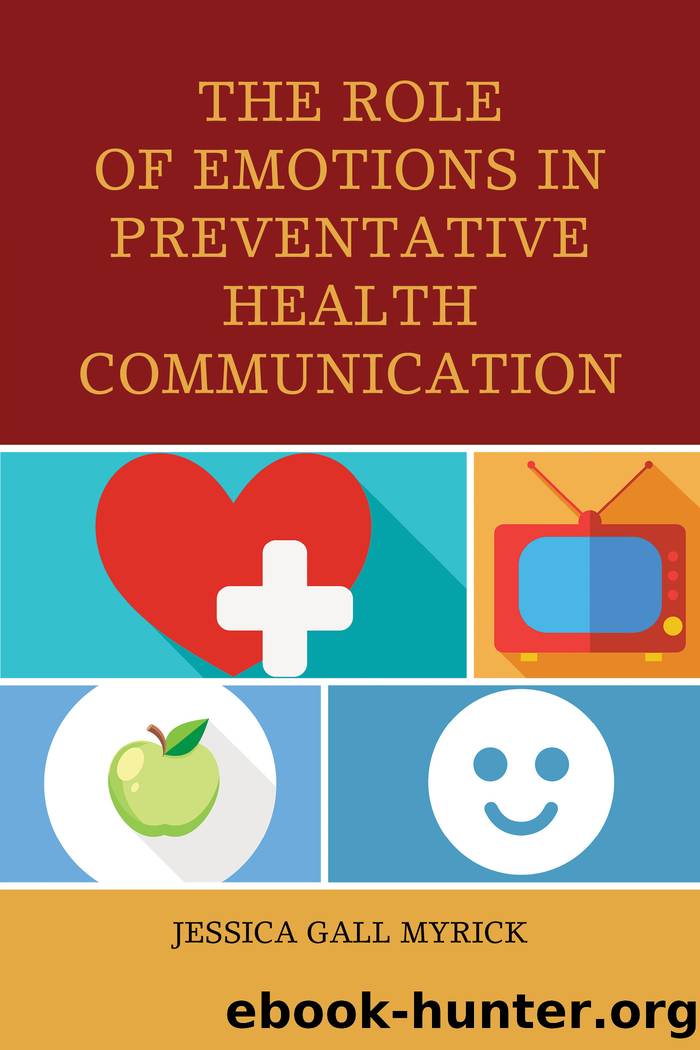The Role of Emotions in Preventative Health Communication by Myrick Jessica Gall;

Author:Myrick, Jessica Gall;
Language: eng
Format: epub
Tags: undefined
Publisher: Lexington Books
Published: 2012-08-15T00:00:00+00:00
Hope and Prevention Messages
A large amount of research exists related to the nature and influence of hope for individuals already diagnosed with an illness. From social support conversations to messages about treatment, research indicates that those with a serious condition often depend on feelings of hope to cope with their situation (e.g., Chi 2007; Folkman and Greer 2000; Thorne, Hislop, Armstrong, and Oglov 2008). However, media research has yet to closely examine the role of hope in understanding audience reactions to prevention-focused health messages.
One realm of health-related media where hope is likely to impact is that of narratives. Narratives, or stories, are powerful tools for conveying health messages, and individuals often respond to narratives with strong emotional reactions to the plot as well as strong affective bonds with the narrativeâs characters (Green 2006; Kreuter et al. 2007; Murphy, Frank, Moran, and Patnoe-Woodley 2011). Because of the ability of narratives to reduce counter arguing (Green and Brock 2000), health-related stories may be able to evoke more hope than non-narrative messages that would more easily allow viewers to argue against possible positive outcomes. However, it should be noted that health-related narratives could also evoke fear in audiences when they contain vivid depictions of potential negative outcomes and/or a not-so-happy ending.
In a study of awareness of breast cancer messages, S. W. Smith et al. (2010) asked women to recall any messages about breast cancer they had seen or heard (in the media or from interpersonal sources), as well as what emotions those memorable breast cancer messages evoked. Hope was one of the feelings the participants recalled feeling in response to such messages. The participants also reported feeling fear, anger, sadness, and relief after seeing breast cancer messages. However, hope was the emotion most often recalled as being associated with treatment messages, while hope was not associated with the recollection of either prevention or detection behavior messages. The prevention-focused hopeful messages the women did recall were entirely from media, and not interpersonal, sources. This indicates that media-based appeals to hope may be a memorable way to present preventative breast cancer messages. However, additional work is needed to test this idea across multiple health contexts.
Beyond a potential impact on audience memory for health messages, feelings of hope arising from such messages have been shown to impact behavioral intentions. Volkman and Parrott (2012) tested how narratives about osteoporosis that expressed either positive or negative emotions, and that varied in the narratorâs perspective, shaped reader responses to stories about osteoporosis. They found that positively toned stories were more likely to elicit feelings of happiness, hope, and relief than were negatively toned stories. Additionally, hope was directly and positively related to perceived message effectiveness, which in turn was a positive predictor of intentions to take calcium and vitamin D supplements and to perform weight-bearing exercise (behaviors that help prevent osteoporosis).
Research also indicates that feelings of hope may be tied to self-control. Although their study did not take place in a media context, Winterich and Haws (2011) tested the impact of various positive emotions on self-control related to health behaviors.
Download
This site does not store any files on its server. We only index and link to content provided by other sites. Please contact the content providers to delete copyright contents if any and email us, we'll remove relevant links or contents immediately.
| Anthropology | Archaeology |
| Philosophy | Politics & Government |
| Social Sciences | Sociology |
| Women's Studies |
Nudge - Improving Decisions about Health, Wealth, and Happiness by Thaler Sunstein(7693)
The Fire Next Time by James Baldwin(5431)
iGen by Jean M. Twenge(5409)
Adulting by Kelly Williams Brown(4566)
The Sports Rules Book by Human Kinetics(4379)
The Hacking of the American Mind by Robert H. Lustig(4375)
The Ethical Slut by Janet W. Hardy(4242)
Captivate by Vanessa Van Edwards(3838)
Mummy Knew by Lisa James(3686)
In a Sunburned Country by Bill Bryson(3537)
The Worm at the Core by Sheldon Solomon(3486)
Ants Among Elephants by Sujatha Gidla(3463)
The 48 laws of power by Robert Greene & Joost Elffers(3254)
Suicide: A Study in Sociology by Emile Durkheim(3019)
The Slow Fix: Solve Problems, Work Smarter, and Live Better In a World Addicted to Speed by Carl Honore(3007)
The Tipping Point by Malcolm Gladwell(2914)
Humans of New York by Brandon Stanton(2868)
Handbook of Forensic Sociology and Psychology by Stephen J. Morewitz & Mark L. Goldstein(2704)
The Happy Hooker by Xaviera Hollander(2686)
